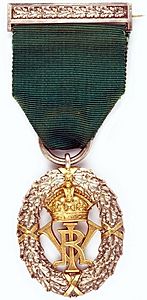Volunteer Officers' Decoration for India and the Colonies facts for kids
Quick facts for kids Volunteer Officers' Decoration for India and the Colonies |
|
|---|---|
 |
|
| Country | |
| Type | Military long service decoration |
| Eligibility | Officers of the Volunteer Forces throughout the British Empire |
| Awarded for | Twenty years meritorious service Eighteen years service in India |
| Status | Discontinued in 1899 |
| Post-nominals | VD |
| Statistics | |
| Established | 1894 |
| Order of wear | |
| Next (higher) | Volunteer Long Service Medal |
| Next (lower) | Volunteer Long Service Medal for India and the Colonies |
| Related | Volunteer Officers' Decoration |
Ribbon bar |
|
The Volunteer Officers' Decoration for India and the Colonies was a special award. It was given to officers in the Volunteer Forces across the British Empire. This award recognized long and excellent service. It allowed recipients to use the letters VD after their names.
This decoration was first created in 1894. It was similar to another award, the Volunteer Officers' Decoration, which was for officers in the United Kingdom. The award for India and the Colonies was stopped in 1899. It was replaced by other awards, like the Colonial Auxiliary Forces Officers' Decoration.
Contents
How the Award Started
The original Volunteer Officers' Decoration began in 1892. Queen Victoria created it with a special order. This award was for officers in the United Kingdom's part-time Volunteer Force. To get it, officers needed to serve for twenty years. They also had to be very good at their jobs.
Creating the Colonial Version
On May 24, 1894, Queen Victoria decided to extend this award. It would now include officers in Volunteer Forces across the entire British Empire. This included places like India, Canada, and other colonies and dependencies.
A new, separate award was then created. This was the Volunteer Officers' Decoration for India and the Colonies. It looked much like the original award. However, it had the Queen's special mark "VRI" on it. This stood for "Victoria Regina Imperatrix," meaning "Victoria, Queen and Empress." The original award just had "VR" for "Victoria Regina" (Victoria, Queen).
Some places, even in the colonies, kept giving out the original award. This continued until a new award, the Efficiency Decoration, was introduced in 1930.
Who Could Get the Award
To receive this decoration, officers usually needed twenty years of service. But in India, it was eighteen years. Any time spent in Volunteer Forces across the Empire counted towards this service. Also, half of any time spent in the regular military forces counted too.
Receiving the award did not give someone a higher rank. However, it did allow them to use the letters "VD" after their name. This showed they had earned the decoration.
The power to give or take away this award belonged to the Queen. But in practice, it was handled by important leaders. These included the Governor-General of India or the Governors of the different colonies. The names of those who received or lost the award were published in local official newspapers. They were not published in the London Gazette.
What the Decoration Looked Like
The decoration was shaped like an oval. It was made of silver, with some parts covered in gold. It was about 43 millimeters (1.7 inches) tall and 35.5 millimeters (1.4 inches) wide. It hung from a silver ring.
- Front (Obverse): The front showed an oak leaf wreath made of silver. It was tied with gold. In the middle, there was the Queen's special mark "VRI" under a gold crown.
- Back (Reverse): The back was plain. It had small marks to show where it was made. The award was given without a name on it. But often, people would have their names engraved on it later.
- Ribbon: The ribbon was dark green and about 3.8 centimeters (1.5 inches) wide. It was the same as the ribbon for the original Volunteer Officers' Decoration. The ribbon hung from a silver bar decorated with an oak leaf pattern.
When the Award Ended
In 1899, the Volunteer Officers' Decoration for India and the Colonies was stopped. This was true for most parts of the Empire. It was replaced by the Colonial Auxiliary Forces Officers' Decoration. However, for the Indian Empire, it was later replaced by the Indian Volunteer Forces Officers' Decoration.
Images for kids
 | Bessie Coleman |
 | Spann Watson |
 | Jill E. Brown |
 | Sherman W. White |

